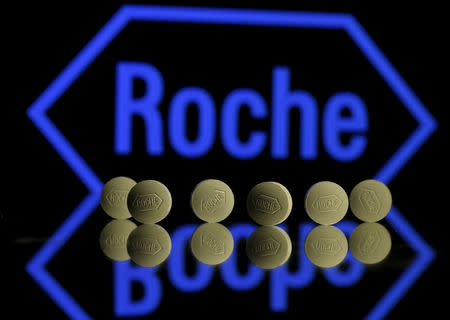Roche pays $2.4 billion for rest of cancer expert Foundation Medicine
By Michael Shields and Ben Hirschler
ZURICH/LONDON (Reuters) - Swiss drugmaker Roche <ROG.S> is paying $2.4 billion (1.81 billion pounds) to buy the rest of Foundation Medicine (FMI) <FMI.O>, raising its bet on the U.S. genomic profiling group's ability to personalise cancer care.
The deal, backed by the boards of both companies, is worth $137 per share - a premium of 29 percent to FMI's closing price on Monday - valuing the Cambridge, Massachusetts-based company at $5.3 billion.
The transaction is set to close in the second half of this year, the partners said in a statement on Tuesday.
It is the latest in a series of bolt-on acquisitions by Roche as the world's largest marker of cancer drugs seeks to tap into promising technology developed by biotech companies to drive future growth as its older drugs face competition.
Earlier this year it agreed to buy the rest of U.S. cancer data company Flatiron Health for $1.9 billion in a similar deal. Both purchases echo its success in taking control of California-based biotech company Genentech 28 years ago.
FMI develops tests to help doctors understand the genetic profile of patients' tumours and guide them to effective therapies.
Vontobel analyst Stefan Schneider said the deal fitted very well with Roche's position as an early leader in matching treatment to genetic profiles.
"This isn't only an advantage for the patients, but also should allow Roche to have more effective and targeted drugs, which should improve drug development and ultimately pricing power," he said.
Roche pharmaceuticals head Daniel O'Day said such technology was "important to our personalised healthcare strategy as we believe molecular insights and the broad availability of high quality comprehensive genomic profiling are key enablers for the development of, and access to, new cancer treatments".
FMI develops comprehensive genomic profiling assays to identify molecular alterations in a patient's cancer and match them with targeted therapies, immunotherapies and clinical trials.
The Swiss group said is planned to preserve FMI's autonomy within the wider Roche group, mirroring the approach of quasi-independence it pioneered with Genentech.
Roche first bought a 56 percent stake in FMI for $1 billion in 2015, so it has already seen the investment grow in value.
But it has a long way to go match the value creation achieved at Genentech, where Roche bought 60 percent of the company for just $2.1 billion in 1990 and enjoyed a string of blockbuster drugs. Roche finally bought out minority investors in Genentech in 2008 for $47 billion.
Citi <C.N> is acting as financial advisers to Roche and Davis Polk & Wardwell LLP is legal counsel to Roche. Goldman Sachs & Co <GS.N> is financial adviser to the FMI Special Committee and Goodwin Procter LLP is legal counsel.
(Editing by Stephen Coates and Keith Weir)

 Yahoo Finance
Yahoo Finance 

